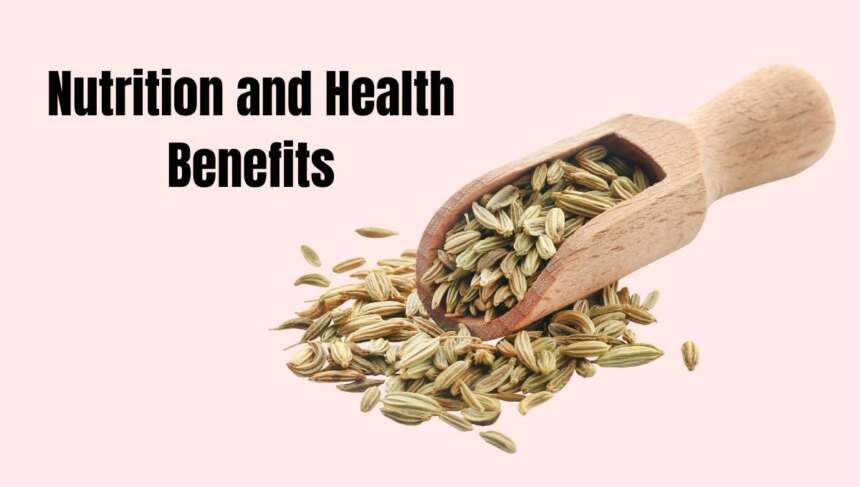Fennel seeds are a common ingredient in many cuisines around the world and have a long history and cultural significance. This article will explain the nutritional value and health benefits of fennel seeds, and show how they can promote overall well-being.
Fennel seeds have lots of amazing benefits that range from ancient remedies to modern cooking, that go way beyond just improving the flavor of food.
Come join us as we explore the secrets of these tiny, mighty seeds and learn how they can enhance both our taste buds and our health.
Nutrition Facts for Fennel Seeds per 100 Grams
- Macronutrients:
- Carbohydrates: 52.29 grams
- Protein: 15.80 grams
- Total Fat: 14.87 grams
- Saturated Fat: 0.55 grams
- Monounsaturated Fat: 9.41 grams
- Polyunsaturated Fat: 2.77 grams
- Dietary Fiber: 39.8 grams
- Sugar: 0.64 grams
- Vitamins:
- Vitamin A: 135 IU
- Vitamin C: 21.0 milligrams
- Vitamin E (Alpha Tocopherol): 0.6 milligrams
- Vitamin K: 62.8 micrograms
- Vitamin B6: 0.470 milligrams
- Folate: 27 micrograms
- Niacin: 6.050 milligrams
- Riboflavin: 0.353 milligrams
- Thiamin: 0.408 milligrams
- Minerals:
- Calcium: 1196 milligrams
- Iron: 18.54 milligrams
- Magnesium: 385 milligrams
- Phosphorus: 487 milligrams
- Potassium: 1694 milligrams
- Sodium: 88 milligrams
- Zinc: 3.7 milligrams
- Copper: 1.067 milligrams
- Manganese: 6.488 milligrams
- Selenium: 7.2 micrograms
- Other Nutrients:
- Water: 8.8 grams
- Choline: 68.1 milligrams
- Betaine: 1.8 milligrams
- Caffeine: 0 milligrams
- Theobromine: 0 milligrams
- Phytochemicals:
- Phytosterols: 50 milligrams
- Lutein + Zeaxanthin: 120 micrograms
- Beta-Carotene: 23 micrograms
- Crypto-xanthin: 0 micrograms
- Lycopene: 0 micrograms
- Isoflavones: 0 milligrams
- Glycine: 0 milligrams
- Proline: 0 milligrams
- Tyrosine: 0 milligrams
- Serine: 0 milligrams
Nutritional Composition of Fennel Seeds
Fennel seeds contain a lot of nutrients which are good for your health. They contain carbs, proteins and fats as well as vitamins and minerals like vitamin C, vitamin K, potassium, calcium, magnesium, zinc, copper and manganese. [Source]
Additionally, fennel seeds are rich in dietary fiber, giving you 39.8 grams of fiber in just 100 grams. Plus, these tiny seeds are packed with amazing ingredients like anethole, limonene, and quercetin, which have anti-inflammatory and antioxidant powers. [Source]
Fennel seeds are full of good things that are great for your health. They are good for your heart because they contain fiber and minerals like magnesium, potassium and calcium. Plus, they also contain antioxidants that can help ward off serious health problems like heart disease, obesity, cancer, brain problems, and type 2 diabetes. [Source]
Additionally, fennel seeds contain important vitamins like Vitamin C and minerals like manganese that help in immune function, tissue repair, enzyme activation, metabolism and bone health. In general, the nutritional value of fennel seeds shows how they can really boost your overall health. [Source]
Digestive Health Benefits
Fennel seeds are great for your digestion and can help with problems like bloating, gas and stomach cramps by relaxing the muscles of your intestine. They’re definitely worth adding to your diet! [Source]
The antimicrobial properties present in fennel seeds can help fight bad bacteria, keeping your gut healthy and balanced. Additionally, the fiber present in fennel seeds helps in digestion, prevents constipation and keeps your bowel movements regular. [Source]
Additionally, the phytochemicals and antioxidants found in fennel seeds, such as anethole and limonene, may help with inflammation and promote good digestion. [Source]
Additionally, fennel seeds can help control blood sugar levels and provide relief from pain. They may also calm inflammation in the intestines, making digestion more comfortable and efficient.
Whether you eat them straight or drink them as fennel tea, these seeds are a great way to help your digestion and feel better overall.
Weight Management and Metabolic Health
Fennel seeds are really helpful in controlling weight and keeping your metabolism in check. They are linked to controlling your appetite and making you feel satisfied, which can help you lose weight by preventing you from overeating. [Source]
Research on fennel seeds and their ability to suppress appetite is still ongoing, but they show promising effects on metabolism and weight management. Fennel seeds are known to help kickstart digestion by increasing the production of gastric enzymes, which can aid in maintaining a healthy digestive system that aids weight loss. [Source]
Additionally, fennel seeds contain a host of antioxidants like phosphorus, selenium, zinc, manganese, choline, beta-carotene, and lutein that keep your body safe from harmful free radicals that cause things like obesity and diabetes. Plus, they can also help you keep your blood sugar levels under control and make your body more sensitive to insulin, which is great for your metabolism. [Source]
You can try incorporating fennel seeds into your diet by enjoying fennel tea or fennel seed water. This is a delicious and easy way to take advantage of their weight management benefits.
Anti-inflammatory and Antioxidant Properties
Fennel seeds have amazing properties like anti-inflammatory and antioxidant properties that can help soothe inflammation and protect against oxidative stress. They contain phytochemicals like anethole, limonene and quercetin which also have the same anti-inflammatory and antioxidant properties. [Source]
These compounds present in fennel seeds may potentially fight chronic diseases like heart disease, obesity, cancer, neurological disorders and type 2 diabetes.
Fennel seeds contain antioxidants that may help protect against oxidative stress, which is a major factor in chronic diseases. They may also help calm inflammation in the gut, making digestion more comfortable and efficient. [Source]
Cardiovascular Health Benefits
Fennel seeds are great for your heart, keeping it healthy and helping your blood flow smoothly. They can also help control blood pressure, which is great for managing high blood pressure.
Additionally, fennel seeds can lower cholesterol, especially the bad kind (LDL), which is good for your heart. Fennel seeds may also help prevent blood clots, reducing the chance of thrombosis and other heart problems. [Source]
By including fennel seeds in their diet, whether they cook with them or use them in fennel tea, people can potentially improve their heart health.
Fennel seeds are great for your heart as they help reduce blood pressure, cholesterol and prevent blood clots. So they are really versatile in keeping your heart and circulation in good shape. [Source]
Respiratory Health Benefits
Fennel seeds are great for respiratory health and can help with problems like cough and asthma. These seeds have natural properties that can soothe respiratory discomfort and make breathing easier. They’re definitely worth adding to your respiratory health routine. [Source]
Additionally, fennel seeds may be helpful in keeping your lungs healthy as they contain anti-inflammatory and antimicrobial properties. These properties can help reduce inflammation in your respiratory tract and fight harmful germs that can affect the way your lungs work. [Source]
Adding fennel seeds to your diet or using them in remedies like fennel seed tea may help improve respiratory health, reduce symptoms of respiratory conditions, and promote overall health in your respiratory tract. It’s worth considering!
Potential Anti-Cancer Properties
According to new research, fennel seeds are actually showing promising potential in fighting cancer. Scientists have found that anethole, a key ingredient in fennel seeds, can actually help prevent the growth of breast cancer cells and self-destruct them.
Additionally, fennel extract appears to be able to prevent breast and liver cancer cells from spreading in test-tube studies. This may mean that fennel seeds may have some cancer-fighting benefits.
Although test-tube and animal studies look promising, we still need more research, especially on humans, to confirm whether fennel or its extracts can actually be used as an alternative cancer treatment.
The antioxidants and plant compounds in fennel seeds help fight cancer, showing their potential in preventing certain types of cancer.
Skin and Hair Health Benefits
Fennel seeds are very good for your skin and hair. They contain antimicrobial properties that can help with skin problems like acne and infections. You can use fennel seeds on your skin or eat them to keep your skin clean and healthy. [Source]
Additionally, fennel seeds can help promote hair growth by giving your scalp and hair follicles a good dose of nutrients like iron, zinc, selenium and essential vitamins. This nutrition helps keep your hair strong and shiny. [Source]
Adding fennel seeds to your skin care or hair care routine can help improve the health of your skin and hair naturally, providing a more holistic approach to beauty and wellness.
Culinary Uses and Incorporation into Diet
Fennel seeds are a great addition to many dishes to bring flavor and nutrition. You can use them in pickling, marinating and seasoning to enhance the flavor of vegetables, meat and seafood.
You can grind fennel seeds and add them to bread, pasta or rice dishes, or use them to add some extra flavor to soups, stews and sauces. Don’t forget that they also work great in desserts like cookies and cakes, or even in beverages like tea and coffee.
To easily incorporate fennel seeds into your daily meals and snacks, simply sprinkle them on salads, mix into yogurt, or add to homemade granola. With their health benefits and ability to enhance the flavor of dishes, fennel seeds are a great addition to any diet.
Precautions and Considerations
When you’re using fennel seeds, just keep in mind that some people may be allergic to them, especially if they’re allergic to carrots, celery, or similar plants. This isn’t very common, but it’s important to be aware of.
It’s a good idea to try a little first to see if you have any bad reactions. Fennel seeds may not mix well with certain medications, such as blood thinners or medications processed by the liver.
If you are taking certain medications, it is a good idea to talk to a doctor before eating fennel. Fennel seeds are usually fine in small amounts in food, but taking too much or in supplements may cause side effects such as nausea, vomiting, or allergies.
It’s a good idea to follow recommended dosages and talk to a doctor before increasing your intake of fennel seeds, especially if you’re using them in larger amounts or as a supplement.
The Bottom Line
Overall, fennel seeds have a ton of health benefits like aiding digestive and respiratory health as well as their anti-inflammatory and anti-cancer properties. They are definitely a great addition to promote overall well-being.
While some studies have shown that fennel seeds have health benefits, it would be good to see what else they can do and how well they work. Adding fennel to your everyday diet and skin care routine can be a delicious way to take advantage of their good stuff.
Using fennel seeds in your cooking can add great flavor and support your overall health, making them a versatile and valuable ingredient for a healthy lifestyle.








